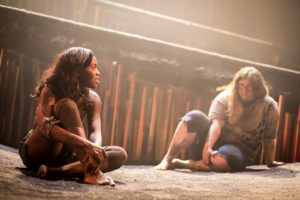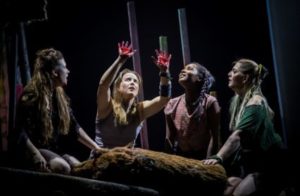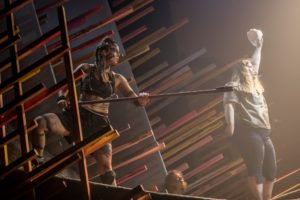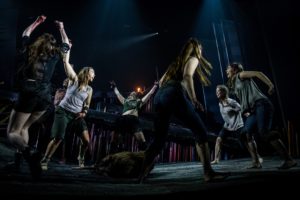Theatr Clwyd/ Sherman Theatre’s bold restaging of William Golding’s timelessly-relevant novel follows an all-female main cast as they delve into the heart of darkness within us all. Marooned on an island after their plane crashes and their guardians perish, a group of schoolchildren in an ambiguously modernish wartime era band together to form their own society in a world that promises freedom and danger in equal measure.
I must confess to only a passing familiarity with the original text; it was something I read during my angsty teenage years and promptly forgot in large part, except for a vague awareness of conch shells and pig heads and descents into moral turpitude. For a more informed analysis of the production as adaptation, I direct you to superb reviews by Vicky Lord and Roger Barrington; as for my experience of the play, it’s more a collection of my thoughts experiencing the story as if for the first time. And what a play it is! Masterfully directed by Emma Jordan, the story is immediate and intense, dropping us into the cacophony of beautifully distinct and dynamically-drawn characters who hold our attention and empathy just as the audience holds its breath right up to the final moment.
Lola Adaja’s fantastic, multi-faceted performance as Ralph anchors the entire production; vibrant and assertive, Adaja brilliantly leads the excellent ensemble and believably transforms from self-assured schoolgirl to stricken survivor by the play’s close. Her fraught friendship with Gina Fillingham’s Piggy feels earnest and earned, aided by the lovely chemistry between the two. The play is of course rather dark overall – but I was surprised by how funny it was too, and though every character gets a comedic moment in which to shine, a lot of the most entertaining moments are there thanks to Fillingham and her superb comedic timing. Piggy is entertainingly bureaucratic, constantly suggesting meetings and memoranda – but she also gives the play its heart, which makes her poor treatment at the hands of her peers even more painful to witness.
One of the most compelling performances comes from Kate Lamb as Jack Merridew, who believes that the divine right of choirmasters/ prefects makes her the only and best choice to rule their new realm. Lamb is delightfully domineering and priggish as the overbearing Merridew, so authentic in her arrogance that she feels like That Person we all remember from our own school days – which makes her twisted transformation all the more powerful. Hannah Boyce’s militant, murderous Roger is genuinely scary and violently unpredictable, nicely contrasting with Lowri Hamer’s uber-innocent Percyval. Olivia Marcus’ Simon adds a welcome serene presence and a calm gravitas to the increasingly grave proceedings. Lowri and Mari Izzard are charming as trouble-making twins Sam and Eric, while Laura Singleton’s Henry and Leah Walker’s Maurice make for an absolutely hilarious double act.
Matthew Bulgo’s anonymous, officiously angry naval officer arrives at the eleventh hour; a Fortinbras-like newcomer to the brutality only the audience had yet borne witness to. Scolding the surviving children for acting in a way he ‘wouldn’t expect of British girls’, the role of moral arbiter disappointingly defaults to the only white man in the story – but we the viewers are the true judges; what he infantilises as a ‘game’ we know to be a complexly brutal social hierarchy that acts as a microcosm for our own vicious world. After all, this is a story in which war rages both across the world and within the human psyche.
Nigel Williams’ adaptation neatly balances character and narrative growth with political commentary, though that means some elements are more developed than others: the major ones being the rivalry between Ralph and Jack, and the strange bond between Ralph and Piggy. Although the remaining characters are all very believably performed, they are given little time to craft their own unique transformations. It doesn’t help that the timeline is a bit confusing, making the inevitable moral downturn feel slightly rushed; and after the macabre mic drop of Act 1’s breathless climactic moments, Act 2 seemed like a hectic sprint through the falling dominoes.
The show is a marvel of innovative design – James Perkins’ jagged, fractured staging combines with Philip Stewart’s chilling music and sound design to convey an uneasily tangible feeling of being right there on the island as the action unfolds. There are a few particularly striking moments when Tim Mascall’s sensational lighting transforms the stage into a living painting – the most astounding of which centres on the hunters, crouched with spears at the ready, silhouetted against a blood orange sky (I haven’t seen such powerful use of chiaroscuro since Bram Stoker’s Dracula).
It’s always a privilege to be invited to speak on the post-show panel, and the discussion following this show was among the most interactive and illuminating yet. Chaired by Timothy Howe, the Sherman Theatre’s Communities & Engagement Coordinator, the panel featured myself alongside the play’s Assistant Director Jesse Briton, and David Mellor, Senior Lecturer of Sociology at the University of South Wales. Jesse spoke about how the creative team focused on the play’s emotional turning points, in which one moment, decision or mistake changed the course of the story irrevocably. David spoke of the gendered expectations of women, highlighting the sexist media response to Serena Williams’ recent on-court behaviour. And I spoke of the play’s excellent exploration of responsibility, the fracturing of mens rea/ the guilty mind across many, and the notion that even the audience bears tacit culpability for the characters’ crimes.
When there are no formal rules to follow, no pressure from the state and no loss of personal liberty or status to act as a deterrent, what else is there to ensure enforcement of order but the threat of violence? The scene in which the group commit a ritual-esque murder whilst already hopped-up on the glory of their first animal kill is distressing and soberingly gruesome. It’s the first breach of the unspoken moral code that only opens the floodgates to more bloodshed; what role can ethics play in a society that holds such depravity as currency? Ultimately, the malleability of the conch’s power reveals that laws only carry the meaning we assign to them.
The fact that the play translates so well with an all-female main cast demonstrates the emptiness of the concept of gendered (mis)conduct. Rather than proving the inherent monstrosity of men (as one reviewer of the novel argued), this version speaks to the notion that everyone has the potential to indulge their baser instincts if the ethical frameworks of law and order are removed; that everyone is fighting the duality of light and darkness with them. But the gender-swapped casting choice also facilitates a reading of the play as a rare exploration of female criminality, and a brutal reclaiming of women’s autonomy and agency in the #MeToo era.
Lord of the Flies is an utterly unrelenting, unmissable journey into our most uncomfortable, unconscious urges. In the characters’ stead, it asks what world you would build; who, or what, would you become?





1 thoughts on “Lord of the Flies, Sherman Theatre Cardiff by Barbara Hughes-Moore”
-
Pingback: End of Year Update & 2019 Plans – The Law Lass
Get The Chance has a firm but friendly comments policy.